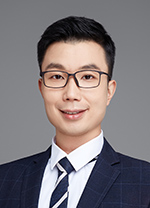从生物游泳者和系统到仿生微型机器人的设计和应用
日期:2022/12/09 - 2022/12/09
学术讲座:从生物游泳者和系统到仿生微型机器人的设计和应用
主讲人:Zijie Qu, Assistant Professor, University of Michigan-Shanghai Jiao Tong University Joint Institute
时间:2022年12月9日(周五)上午10:00-11:30
讲座摘要
Biological systems survive by constantly interacting with their ambient environment and their abilities to navigate, transport and sense are far from human technology. However, we have limited knowledge of these capabilities such as how they achieve precise flow control for swimming, food absorption and cell division. Understanding the biological system-environment interaction will also provide insight for us to build novel devices that allow exquisite control on mesoscale length scales.
In this talk, two major topics will be covered. The first is on the swimming behavior of flagellated bacteria E. coli in both viscous and non-Newtonian media. By tracking individual cells, we study the impact of fluid properties, such as viscosity and non-Newtonian effects, on the swimming modality of E. coli. In the second work, we use the light-activable motor proteins to generate persistent fluid flows and demonstrate the capacity to control and program the contraction and deformation dynamics of the microtubule network, which helps us understand a range of biological processes and provides an ideal platform for a variety of engineering and biological applications.
主讲人简介
 Zijie Qu received his BSc from the School of Mechanical Engineering at Shanghai Jiao Tong University (2013), his MSc from Purdue University (2014) in Mechanical Engineering and his PhD from Brown University (2018) in Engineering. He joined SJTU-JI in July 2021. He mainly focuses on the swimming problem of cells in viscous and non-Newtonian fluids using experimental approaches. Additionally, he studied the non-Newtonian properties of dilute polymer solutions with micro-rheology. In addition, he is working on the fluid and polymer mechanics problems in active matter systems, especially bacteria dense suspension and a microtubule-kinesin system with well-designed experimental methods. He is also interested in building macroscopic models for solving low Reynolds number problems.
Zijie Qu received his BSc from the School of Mechanical Engineering at Shanghai Jiao Tong University (2013), his MSc from Purdue University (2014) in Mechanical Engineering and his PhD from Brown University (2018) in Engineering. He joined SJTU-JI in July 2021. He mainly focuses on the swimming problem of cells in viscous and non-Newtonian fluids using experimental approaches. Additionally, he studied the non-Newtonian properties of dilute polymer solutions with micro-rheology. In addition, he is working on the fluid and polymer mechanics problems in active matter systems, especially bacteria dense suspension and a microtubule-kinesin system with well-designed experimental methods. He is also interested in building macroscopic models for solving low Reynolds number problems.
